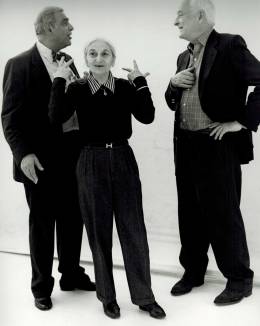
Oscar-winning screenwriter and award-winning novelist Ruth Prawer Jhabvala, center, with film director and producer, Ismail Merchant, left, and director, James Ivory in a studio. Jhabvala (JOB-vah-lah), 85, has died
Let’s start with her name, for many, frighteningly un-pronounceable, yet unforgettable: Ruth Prawer Jhabvala, the accent on the first syllable. Born in Cologne in 1927, she was the daughter of a Polish lawyer and a German mother. As a Jew, she was forced to flee Germany with her family at the last possible moment in the summer of 1939. She was saved because of her father’s Polish nationality. She acquired her formidably difficult surname from her husband Cyrus, an Indian architect whom she married in London, where she grew up, was educated, and learned to speak and write English. In 1951, they settled in Delhi.
She loved being in India at first. After wartime England she found it a land of plenty, full of intoxicating sights, people, weathers and tastes – especially the honeyed Indian sweets. She wore saris, learned a foreign housewife’s Hindustani to direct her servants, was happy generally. She published her first novel, To Whom She Will, in 1957, and her stories began appearing in the New Yorker the same year. But as she stayed on in India, an unease set in. She wrote that there came a time when she felt as if she were standing on the body of a giant beast that moved unnervingly under her. And she felt, too, in India, as in England, that she would always be an outsider. She brooded on this. Her fiction darkened: about India, and her place—or non-place—there, which she recognized could also be a strength.
(LIST: All-TIME 100 Movies)
In 1962, Ismail Merchant and I turned up on her doorstep with a plan to film her fourth novel, The Householder. Thus began our forty-year collaboration. She wrote twenty-two screenplays and television films for Merchant Ivory, all produced. She called writing screenplays her “hobby.” Her real work, she said, was writing fiction, and in 1975, her eighth novel, Heat and Dust, won the Booker Prize, England’s highest literary honor. This was a decade before her screen hits based on novels by E. M. Forster—A Room with a View and Howards End—began earning her Academy Awards for Best Adapted Screenplay.
In 1975, she shifted continents and nationalities for a third time, moving from Delhi, with her husband, to New York and becoming an American citizen. She felt at home there, she said—more at home than anywhere else she had ever lived, finding many people like herself: refugees, outsiders, interesting American discontents.
Henry James, one of her favorite authors, once wrote that it is no bad thing for a young man to go to school to a clever woman. I was that young man. But in her case, she actually had two young men to educate, Ismail Merchant and myself: an education that lasted down to the end of our association with her.
LIST: All-TIME 100 Novels

